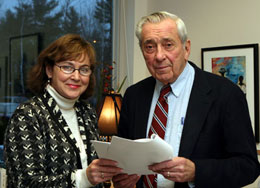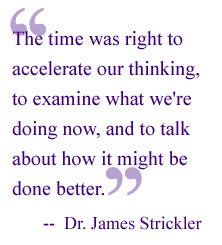
For Release: January 18, 2007
Contact: Susan Knapp 603-646-3661
New Report Stresses Need to Improve Humanitarian Health Responses
HANOVER, NH—When a natural or human-caused disaster strikes, like a tsunami or a civil war, relief organizations mobilize to help people in need. Amidst the chaos, relief workers are trying to deliver the best care they can. But can they do better?
A new report from Dartmouth Medical School (DMS) and the Harvard Humanitarian Initiative discusses the challenge of responding promptly, efficiently, and humanely when disasters occur. The report summarizes work conducted at the first Humanitarian Health Conference at Dartmouth in September.

Humanitarian Health Conference organizers
Mary Turco (left) and James Strickler.
(Photo by Joseph Mehling '69)
"Events like Hurricane Katrina, the tsunami in Indonesia, and the conflict in the Sudan have raised the level of awareness about humanitarian aid workers," says Dr. James Strickler, the dean emeritus of DMS and a chairman emeritus of the board of directors of the International Rescue Committee. "The time was right to accelerate our thinking, to examine what we're doing now, and to talk about how it might be done better."
The September conference welcomed an elite group of about 100 academics, aid workers, and representatives from non-governmental organizations (NGOs) and non-profit agencies. Strickler, who was instrumental in organizing the event, was pleased that a productive conversation ensued over the course of the three-day conference.
The report outlines the four main issues discussed at the conference: increasing the numbers and elevating the professional recognition of people who work in humanitarian aid; providing better oversight of technical and strategic support in the field; developing guidelines to monitor and evaluate requirements for health programs; and coordinating response activities and encouraging collaboration among agencies.

"The report makes recommendations and lists a few examples of best practices, and we don't intend to lose that momentum. This is the first of many discussions," says Mary Turco, another key conference organizer and the director of the Center for Continuing Education in the Health Sciences and of Continuing Medical Education at DMS. "The follow-up conference, this time in Cambridge, Mass., is already being planned."
Both Turco and Strickler admit that they themselves are not professional humanitarian health workers, but both are deeply involved in organizations working in this field. They explain that better responses to complex emergencies have been evolving over the past several years. These complex situations now involve many simultaneous issues, some or all of which might be occurring at any given point during a disaster, such as finding reliable shelter and clean water, encountering people suffering from severe injuries, securing access to adequate food or medical supplies, increasing threat of personal harm in dangerous territory, and the resettling of refugees either in their home country or elsewhere.
"Basically, we're looking for ways to better manage chaos," says Strickler. "We know we can do a better job. This report is the very first step. And we're delighted that this report was discussed at the World Health Organization meeting last October. It has already started to inform changes in how complex emergencies are handled."
The conference was sponsored by Dartmouth Medical School and the Harvard Humanitarian Initiative, and it was supported financially by Dartmouth's Dickey Center for International Understanding, the DMS Dean's Office, the Department of Community and Family Medicine, the Center for Evaluative Clinical Sciences, and the New England Center for Emergency Preparedness, all at Dartmouth. Other supporters include AmeriCares, the International Rescue Committee, Save the Children, the Global Health Council, the American Medical Association Foundation, Becton-Dickinson and Company, Merck, Schering-Plough, Pfizer, and Baxter.
-DMS-